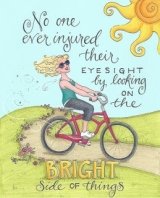|
What we feed our bodies feeds our eyes.
Many of the vitamins and minerals in our bodies are found in much higher concentrations in our eyes, so a diet lacking in these vitamins and minerals can lead to vision problems as we grow older. Take the time every day to give your eyes (and the rest of your body) the nutritive support they need. Eat the foods and take the supplements that provide the antioxidant vitamins and minerals your eyes require. You’ll Protect Your Eyesight, ensuring years of good eye health, and increasing the odds that you’ll avoid blindness or vision loss for the rest of your life. If you find this newsletter useful, please do a friend and us a big favor and "pay it forward." Forward this issue to all your friends. If a friend passed this issue along to you, and you like what you read, please subscribe by visiting... Protect Your Eyesight Do You Have a Vision Story That You Can Share? I need your help. I have a page on this website that is for my readers to tell their Eyesight story. My hope was to have people tell their story so it might help someone else with the same problem or experience. But lately there has not been any activity on this page. Could you please look at this page and contribute someone if you can. Thank You Do You Have a Story That Could help Someone Else? Click Here
Table of ContentsBehavioral Optometry Never heard of behavioral optometry? Well, many people haven’t. This growing subspecialty of optometry uses vision therapy— eye exercises performed in the doctor's office and at home —to go beyond the usual concerns of vision care and treat according to Visionandlearning.org, a behavioral optometry Web site. It can also treat a child who experiences “trouble in sports,” who “frustrates easily,” displays “poor motivation,” and “does not work well on his/her own.” How is this possible? Behavioral optometrists believe that these kinds of behaviors, as well as poor performance during visual tasks, are a sign of nonoptimal visual skills. According to Dr. Stanley Appelbaum, author of Eye Power: A Cutting-edge Report on Vision Therapy, this unique approach to understanding the role of the eyes in thinking and learning involves “ how eyes work together and move together and process information and store information and do something with the information.” Therefore, so-called behavioral problems can be tackled from the standpoint of getting the eyes and brain to work together better. Arizona Cardinals wide receiver Larry Fitzgerald is a good example. As a child, he did not do well in school and was a poor athlete. But his grandfather began to use vision drills, such as asking his grandson to balance on a board while trying to track a dot, or walk on a wood rail while focusing on an object. This vision training was designed to improve perception, hand-eye coordination, reflexes, focus, and more; Fitzgerald credits it for his successes, both on and off the field. Appelbaum himself suffered from chronic headaches as a child, and thus hated to read. In optometry school he discovered he had “convergence insufficiency,” a condition characterized by eyes that don’t turn in together, affecting close work such as reading. He was treated with eye exercises , and his headaches disappeared. Now he loves to read. According to the American Optometric Association, “Studies indicate that 60 percent of children identified as ‘problem learners’ actually suffer from undetected vision problems and in some cases have been inaccurately diagnosed with attention-deficit disorder or attention-deficit hyperactivity disorder.” As a recent New York Times article noted, “Many behavioral optometrists say that 20 to 25 percent of children overall have vision problems that can impede their ability to reach their potential. These problems commonly include: poor eye-movement control or ‘tracking issues,’ problems with accommodation (when the eyes don’t focus well together or sustain focus at various distances), convergence insufficiency, difficulties sustaining visual attention, poor visual-motor integration (bad hand-eye coordination), weak visual form perception (the ability to reproduce and generalize shapes) and poor visual memory.” If behavioral optometry can help even a fraction of these kids reach their potential—and there is experiential evidence that it can—then this exciting new field has the potential to revolutionize the lives of millions.
Vision Facts of the Month * A newborn baby's eye measures approximately 18 mm in diameter and will grow to about 24-25 mm in diameter. The visual acuity of newborns is about 20/400. Their vision improves rapidly and may reach 20/30 to 20/20 by the age of 2-3 years.
Learn which eye vitamins naturally improve eye health. The Rebuild Your Vision Ocu-Plus Formula was designed to improve vision and eye health, and help people with Macular Degeneration, Glaucoma, and Cataracts. Click Here To Learn More.
Comments? Ideas? Feedback? We want to hear from you with your complaints, compliments or suggestions. That's the only way we can make EyeSight Vision Care! more useful for you. Have something to tell us? Click on Reply in the menu and tell us what you think! |
More Information
Vision Training for GOLF...
"Everything you wanted to know about how your eyesight affects your game, with self tests and tips to aid alignment, reading greens and judging speed and distance. Much more fascinating than it sounds."- Golf Magazine - Click Here!



